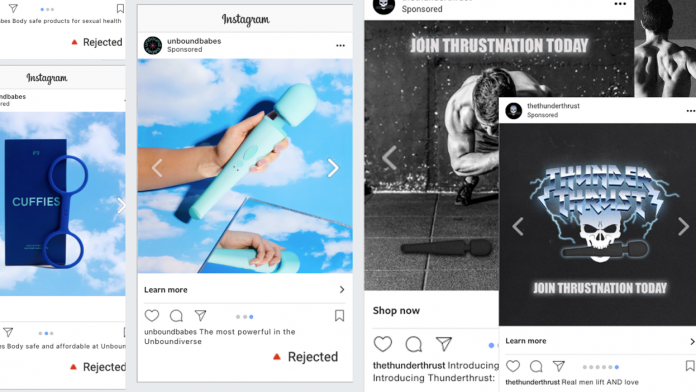When Unbound submitted ads for its sexual wellness products like its Ollie wand vibrator, Bandit cock ring or Cuffies handcuffs, advertised to embrace femininity with backdrops that were color-rich or a soft blue sky, Meta rejected them; however, ads for the same products, marketed with darker, “tougher” color schemes of black and grey with more “masculine” bold fonts were approved.
Unbound is a wellness brand with a mission to sexually empower a group of people historically deprived of pleasure.
“We want as many people as possible to have the best sex possible,” Unbound’s CEO and co-founder Polly Rodriguez explains in a video released on Twitter. “But the problem is that we cannot reach them.”
Unbound’s Senior Content Manager, Maddy Siriouthay, goes on to explain that, while “many advertising platforms write their compliance policies through the lens of family planning — products that assist or prevent pregnancy,” ads for erectile disfunction and “male” sexual problems still were approved, while products which assist in menstrual pains and “female” sexual problems were not.
Here is a piece of Meta’s Adult Product or Services ad policy for reference:
“Ads must not promote the sale or use of adult products or services. Ads promoting sexual and reproductive health products or services, like contraception and family planning, must be targeted to people 18 years or older and must not focus on sexual pleasure.”
While both the male and female-marketed ads technically violate this policy as described here, Unbound found that “Thunderthrust” got away with an explicitness which Unbound could never. By marketing the same toys to a different audience, Unbound way able to provide a telling portrait of Meta’s gender bias in marketing rules.


This long-standing problem doesn’t just affect Unbound. Earlier this year, a number of other wellness companies, with the counsel of the Center for Intimacy Justice, filed a complaint with the Federal Trade Commission (FTC) requesting that they take action against Meta’s rejection of female-focused ads. Although Meta’s policy change in October 2022 allows sexual health, wellness and reproductive health ads (which aren’t focused on pleasure), Unbound’s experiment shows that there’s still more work to be done.
The Center for Intimacy Justice has an ongoing petition to #StopCensoringSexualHealth, which Unbound encourages everyone to sign as a means of taking collective action.
“These policies are discriminatory in the way they are written, because they only allow one gender identity access to the tools and information that support a holistic definition of sexual wellness,” says Rodriguez in another Twitter video.
“We’d love to talk to Meta about improving the policies so that they are less gendered in how they are written and applied, and we’d welcome any conversation at any point in time,” Rodriguez continues, but explains that Meta has not been willing to come to the table, historically, to discuss.
“Vibrator ads might seem a tedious hill to die on,” says Siriouthay in Unbound’s video, “but companies like Meta which own social media networks like Facebook and Instagram have major influence in what we see every day, which can then influence our subconscious beliefs, and the choices we make, and the opportunities we have.”
Read the original story from Mashable here.
See the Instagram post where Unbound revealed their experiment right here.
Featured image and all images included belong to Unbound, and are courtesy of Mashable.














You must be logged in to post a comment.